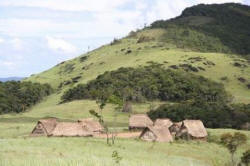|
 Amazonian
tribe study shows how human bodily bacteria is changing Amazonian
tribe study shows how human bodily bacteria is changing
 Send a link to a friend
Send a link to a friend
[April 18, 2015]
By Will Dunham
WASHINGTON (Reuters) - Everyone's body is
brimming with bacteria, and these microbes do plenty of good things like
building the immune system and helping digestion. But modern diets,
antibiotics and hygiene seem to be reducing the range of microbes
occupying our anatomy.
|
|
 A study published on Friday looking at the gut, mouth and skin
microbes in people from a small, isolated tribe in southern
Venezuela's Amazonian jungles shows just how much modern life may be
altering humankind's bodily bacteria. A study published on Friday looking at the gut, mouth and skin
microbes in people from a small, isolated tribe in southern
Venezuela's Amazonian jungles shows just how much modern life may be
altering humankind's bodily bacteria.
The Yanomami villagers, secluded from the outside world until 2009,
possessed the most diverse collection of bacteria ever found in
people including some never before detected in humans, said
scientists whose research appears in the journal Science Advances.
The researchers were surprised to learn the Yanomami's microbes
harbored antibiotic-resistant genes including those conferring
resistance to manmade antibiotics, considering they never had
exposure to commercial antibiotics.
Every person hosts trillions of microbes, collectively called the
microbiota, that live in and on virtually every part of the body.
They contribute to functions essential to human health including
immune system development, processing food and confronting invading
pathogens.

"Our study suggests that the pre-modern human microbiota was
composed of a greater diversity of bacteria and a greater diversity
of bacterial functions when compared to populations impacted by
modern practices, such as processed foods and antibiotics," said
pathology and immunology professor Gautam Dantas of Washington
University in St. Louis.
A microbiota diversity decline may be linked to the increase in the
past several decades of immunological and metabolic diseases such as
asthma, allergies, diabetes and obesity, said Maria Dominguez-Bello,
a professor of medicine at New York University's Langone Medical
Center.
[to top of second column]
|

The researchers analyzed microbial samples from 34 of the 54
Yanomami villagers. They were compared to a United States group,
another Venezuelan Amazonian indigenous people, the Guahibo, and
residents of rural Malawi in southern Africa.
Yanomami were found to have twice the number of microbe varieties of
the U.S. subjects and 30 to 40 percent more diversity than the
Malawians and Guahibo. Some of the bacteria found in the Yanomami
but not in the others offer beneficial effects like protecting
against kidney stones.
The Yanomami are semi-nomadic hunter-gatherers in their remote
mountainous region.
"It really is a unique opportunity to contact communities with this
ancient lifestyle," said Oscar Noya, a researcher with the Amazonic
Center for Research and Control of Tropical Diseases in Venezuela
who visited the villagers.
(Reporting by Will Dunham; Editing by Grant McCool)
[© 2015 Thomson Reuters. All rights
reserved.]
Copyright 2015 Reuters. All rights reserved. This material may not be published,
broadcast, rewritten or redistributed.
 |